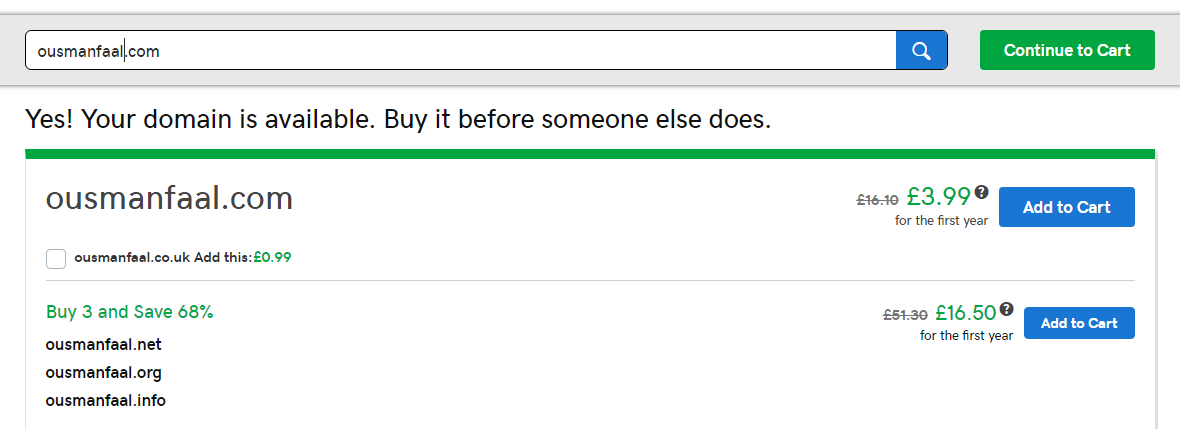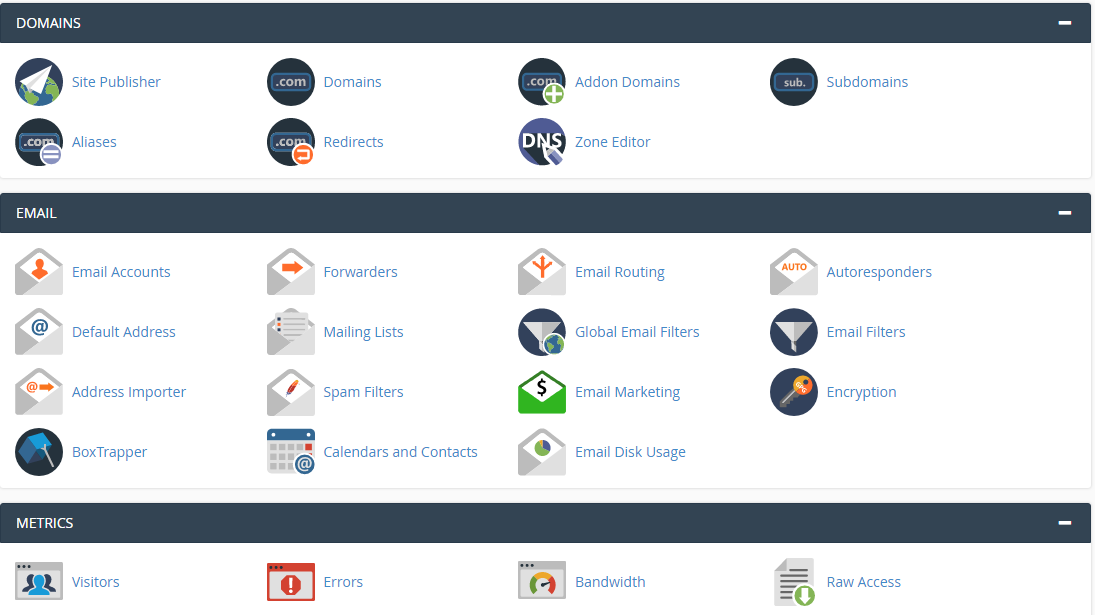Probably you have heard people talking about domain names and web hosting, but you have been kind of confused about what these terminologies actually mean. Maybe you knew little about them and want to understand it better. Many beginners find it hard to understand the difference between the two.
In this guide, I am going to help you understand what a domain name and web hosting are and why you need them for your web project.
I have been developing and designing websites for a couple of years now, and I am excited about web technologies. I have learned quite a lot along the way, and trust me; it took me a while before I could get some of these web terminologies in my head. But lucky you, I am going to share my experience with you and I will try my best to make it very easy for you to understand.
Why do you need both a domain name and web hosting for your website or Web Application?
For your website files to be accessed online, it needs to be hosted on a special computer called a Web Server. And the hosted files also need a unique address to be located on the digital haystack (The Internet). Both components are needed for your web project to be live and accessible on the World Wide Web.
What is a Domain Name?
A domain name is the unique address of a website or web application on the Internet. For example: www.ousfaal.com is a domain name. Look at a domain name as the precise address of your house, for people to come to your house, they need to know your address. So, a website’s domain name is what users’ type on their web browsers to access your website.
The Internet is a giant network interconnecting different computers and devices, to make finding and identifying these computers easier they are assigned an address called an IP (Internet Protocol) Address. Every computer connected to the Internet has a unique IP address. An IP address looks like this: 157.240.21.35. But remembering the IP addresses of all your favourite websites might seem practically impossible; that’s why friendly looking domain names are used instead of string of numbers. It’s easier to remember www.faalen.com than 157.240.21.35. Let’s leave the numbers for the computers and devices to communicate with.
Types of Domain Names
There are different types of top-level domains, and the most common type is .com (commercial, company). But there many others like .net (networking), .org (organisation), .edu (education), .gov (government), .mil (military), .info (information), .biz (business), .blog (blogs) and many others.
Choosing the appropriate domain suffix depends on your project. Countries also have their own top-level domains, for example: .sn (Senegal), .gm (Gambia), .nl (Netherlands), .us (United States), .co.uk (United Kingdom), .gh (Ghana) etc.
The organisation responsible for assigning domain names and numbers is called Internet Corporation for Assigned Names and Numbers (ICAAN). It’s a non-profit organisation responsible for coordinating the maintenance and procedures of several databases related to namespaces and numerical spaces of the Internet.
Subdomain
A subdomain is a subdivision of a primary domain, it enables you to have multiple sites on a single domain name. For example: demo.faalen.com is a subdomain of faalen.com. A subdomain is like a subfolder inside a main folder.
A subdomain is usually a separate site but share the same domain name with the main website. Subdomains are normally used to separate and organise web content.
There’s also something called a subdirectory Site, which is also a subfolder within a main directory. A subdirectory address looks like this www.faalen.com/entertainment. The address structure is different from a subdomain address.
You can have as many subdomains and subdirectories as you wish depending on your web hosting provider or the package chosen.
How can you register for a domain name?
There are so many domain retailers out there where you can purchase a domain name online. One of the most popular in the industry is Godaddy.com. You also have namecheap.com.
To register a domain name, all you need to do is to go to a domain retailer’s website and search for your desired domain name address for availability.
Domain name retailers or registrars are accredited ICANN retailers who are authorised to sell domain names.

If the domain name is available, you can purchase it with a debit, credit, paypal or other online payment methods. Once you acquire a domain name it becomes yours forever as far as you’re paying the annual renewal fee.
What if the domain you want to buy is already taken?
Domain names are unique, meaning, no two websites can have the same domain name address. Usually, when someone wants to purchase a domain name; they search to see if it’s available or taken. When taken, they usually look for an alternative. For example: I wanted to purchase the domain name www.faal.com and it was already taken. Then I later decided to go for www.ousfaal.com as an alternative. Or I could’ve also looked for a different domain name suffix like www.faal.net, www.faal.info, www.faal.co etc.
Some companies or individuals might want to acquire and secure some domain names so no one can buy them. For example: The Main domain name for Facebook is www.facebook.com but you can also access it with www.fb.com. This is called domain parking, when two or more domain names point to the same website.
In a case that someone purchased a domain before you, you can buy it from that person if the person wishes to sell it. Some people purchase to secure domains, especially shorter ones for future use or to resell it for a higher price.
What if you mistakenly purchase the wrong domain name?
In my experience, I once mistakenly purchased a wrong domain from Namecheap.com. The domain name was supposed to have .org but I forgot and used .com. When I contacted Namecheap.com support team, they said, registered domains cannot be edited/renamed. So, I decided to request for a refund, and because the registration of the domain name and the time I requested for refund was less than 72 hours; they were able to cancel the domain name and make a refund to my account.
What is Web Hosting?
Hosting a website is putting it online for everyone to access. Hosting a website or web application is when you upload your website files to a web server connected to the Internet. This is usually done by renting a disk space on a hosting company’s web server for a period of time (monthly or yearly). Just like renting a house or an apartment.
Web hosting companies provide different hosting packages based on your project.

Types of Web Hosting
There are three common types of web hosting, Shared, Dedicated and VPS Hosting. The one you choose depends on your project.
Shared Hosting
Shared hosting is when one web server is containing multiple web hosting accounts. Look at it as a guest house with different apartments, each apartment has a different number but they all share the same address, and also each apartment usually has limited number of people in it based on the resources available in each apartment.
Websites on a shared hosting server usually share the same IP address but on a different account on the same computer (web server). They also share the same resources (RAM, CPU, and Hard Drive).
Most hosting companies have different packages for shared hosting with differences in storage space, bandwidth, and other features. Every client has an account on that server with a control panel to manage the hosting account. Shared hosting is usually far cheaper than other types of hosting.
Dedicated Hosting
Dedicated hosting is when you lease a dedicated computer that you don’t share with anyone else. With dedicated servers you have full control over the server; you can choose your choice of operating system and hardware. This is usually very expensive and meant for big projects.
Virtual Private Server (VPS)
VPS is a virtual machine (non-physical computer) that you rent from a hosting provider as a service. A VPS runs its own operating system, and as a customer you may have root access to that Operating System instance and install your own software. They function almost like a dedicated server but VPS is not a physical machine. It’s a virtual machine existing within a physical machine.
It still shares hardware resources with other virtual machines in the same physical machine. While VPS almost work the same as a dedicated server but it’s usually cheaper.
How can you register for a web hosting?
You can rent a Web Hosting server space online with web hosting providers on a monthly or yearly recurring payment plan. Usually, when you pay for web hosting from a hosting provider; you are given a free domain name alongside. When your web hosting account is ready you’re given a control panel to manage your website files or configure some other useful settings.

Can my web hosting and domain name be from different companies?
Yes. You can register your domain name from company1 and your web hosting at company2 and then point the domain name to the web hosting server using the NAMESERVERS provided by the hosting company. You do this configuration setting on the control panel of your domain name’s account.
Can I move my domain name to another registrar?
Yes. You can move your domain name from one registrar to another by proving a transfer code. Let’s say you bought a domain name from Godaddy and later want to transfer it to Bluehost, you can simply initiate the transfer from your current domain name registrar through your control panel, and provide the auth or EPP code to the new registrar you want to transfer it to.
Registrar restrictions that apply to all .COM .net .org domains state that a domain cannot be transferred if registered or renewed within the last 60 days. It can take up to 7 days for the transfer of a domain name to complete. Ensure that the domain name is unlocked and privacy protection is disabled before transferring.
Also edit your domains ‘WHOIS‘ settings and make sure your email address is the ‘administrative’ contact because you will be sent an email to this address which you MUST receive and click the authorization link.
Can I move my website to another web hosting company?
Yes. Moving from one web hosting company to another is like moving from one house to another. Maybe you’re not satisfied with the condition of your landlord’s house, the roof is licking, you don’t get water frequently or maybe you just want to change to a better and more secure environment.
To move from one web host to another, you’ll need to create a full backup of your website files and database and then import it to the new web host. You may also need to point your domain to the new web host.
Can I host my own website at home?
Yes. You can host your website at home if you have the right infrastructure and technical know-how. You’ll need to purchase a static public IP address from your Internet Service Provider (ISP) which will be the unique address of your server on the Internet. Doing this means you are on your own when it comes to security, performance, backup, constant power supply, scaling, temperature etc. You only go for this option if it’s highly necessary and there is a strong budget for it.
What happens when your domain name or web hosting expires?
Your domain name expires the exact date it was purchased, and it needs to be renewed every year to maintain it. You will be emailed by your domain registrar about 3 months before the domain name expires; so that you can make the payment on time.
If by any means the domain expires, your domain goes to a Redemption Period. During this state, it would cost over 100 USD to restore the domain or you can alternatively wait for the domain to be deleted and then you register it at a normal price.
If your hosting account expires, when visitors go to your website they will see something like Account Suspended. The account owner is usually given 30 days called the Grace Period, and if by this time you did not pay, your account and all associated files will be deleted. That is why it’s recommended to set your payment to automatic renewal to avoid that from happening.
Final Thoughts
Before purchasing a domain name or renting a web server for your web project as a beginner, make sure you make a good research on web hosting providers. Ask experienced people to help you make the right decision.
To keep things organise in one place, make sure your domain name registrar and web hosting provider is the same company. Remember, all web hosting providers are also domain name registrars, and every hosting account you pay for includes a domain name.
I hope this guide was helpful, thanks for reading and don’t forget to share and subscribe to receive notifications of new posts via email.
You can also check out our YouTube channel for technology videos.
Ousman Faal [Digital Vigilante] is a Tech Entrepreneur & Digital Skills Trainer who teaches both in the classroom and online. He has experience in various technologies and likes sharing it with others. Ousman has published 149 articles on this blog. He is the CEO of Faalen Technologies and Skills.gm.




